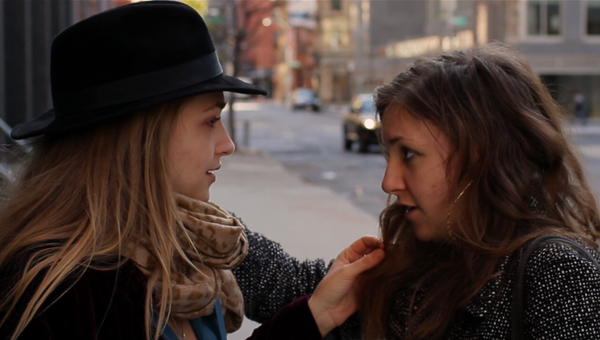Tiny Furniture Review

“I’m suffering from postgraduate delirium.” Aren’t we all.
Tiny Furniture is Lena Dunham’s ode to the uncertainty of youth. Or rather after-youth. Maybe even almost-adulthood. That languid grey-area that young people wade into upon leaving the life-affirming cocoon of higher education.
Dunham plays 22-year old Aura, who “returns home from university to her artist mother’s Tribeca loft with a useless film theory degree, 357 hits on her YouTube page, a boyfriend who’s left her to find himself, a dying hamster and her tail between her legs.”
To be honest, those first few lines of this blurb tell you pretty much all you need to know.
“Her artist mother”: Just what every graduate needs, a parent who’s somehow found success in one of the most pot-luck professions around; hammering home how little you really know about your future and how un-yellow brick road the path to success really is.
Imagine having Tracy Emin as a mother and the confusion/delusion cocktail that baby would suckle each hour. Eventually they’d wake up every morning with an elephant-sized sense of entitlement, staring at their unmade bed as though it were a piece of art.
Oh wait.
“Tribeca loft”: I’m fucking edgy. Actually that’s a lie; my tights are sagging, I don’t ‘get’ modern art, I never liked wine and I don’t know what the hell I’m doing.
“Film theory degree”: how many graduates out there do you think left university, shiny degree in hand, and thought “Shit, just what the hell do I do with this?” Those super-8 tinted hours spent wearing berets whilst smoking Vogues, discussing new-wave French cinema and the social repercussions of digitalisation in modern film-making feels like a fat, naked man laughing in the corner when a job description require you have a degree in something useful yet utterly dull like marketing, business management or any other degree only balding men with perspiring upper lips take.
“357 hits on YouTube”: This is where I comment on the exponential growth of social media and the significance this has had on the way young people communicate in a competitive, attention-seeking digital landscape. These platforms have become so ingrained into our everyday life that it’s now a very real, tangible part of how we young folk form our identities. Detag.
“Her boyfriend who’s left her to find himself”: Everyone tells you university is where your most significant relationship will happen. Whatever.
“A dying hamster”: A metaphor for Aura’s moribund youth that lies forever just out of reach now she’s on the cusp of adulthood. Fuck adulthood. Who actually wants to grow up, get boring, pay bills and stop walking to the corner shop in pyjamas when it no longer means you’re fun and fancy free but mentally unstable?
“Her tail between her legs”: That’s it. The crux and centrifugal force around which the entirety of Tiny Furniture farcically revolves.
Tiny Furniture’s ensuing story is that of Aura’s search for an identity and purpose, while juggling new flames, old friendships and her claustrophobic family.
Capturing the disjoint between precocious degree-euphoria and the reality of home, Aura flounces around with pretentious misgivings in hand, a satchel of minor problems and a self-satisfying recklessness born of parent-free abandon.
Returning home, as Dunham portrays so acutely, pitches these two selves against each other. Aura struggles to reconcile her new found sense of maturity with that of her former self; the whining, adolescent twelve year-old that surfaces with each parental nag.
The self that feels deflated, quite literally in one scene involving a blow-up mattress, by the chaos and grandeur of the real world and the complete uncertainty of what happens next. Or of what you’re supposed to be.
The self that pushes against authority whilst craving the comfort it provides. Does adulthood actually exist or are we all just playing at it?
The thematic web of female eccentricities Dunham’s character Aura has to navigate is often glaringly highlighted by Cinematographer Jody Lee Lipes’ tendency to use on-screen mirroring, setting up stylised female v female symmetrical shots.
Tiny Furniture is a candid and comic exposé on postgraduate angst and the torpor of incertitude, set against a Lonely Planet’s anti-Manhattan backdrop of rain splattered pavements, old air vent pipes and nondescript street corners.
Filtering through the pomp and ceremonious crap of newspaper headlines and faux concerned politicians, Dunham strikes at the bare naked reality of the humorous, uncertain, ridiculous, everyday actuality of being young, educated and without a clue.
Seraphina Trent D’Arby